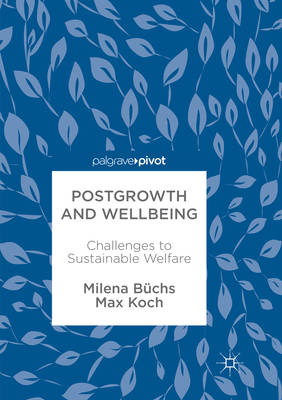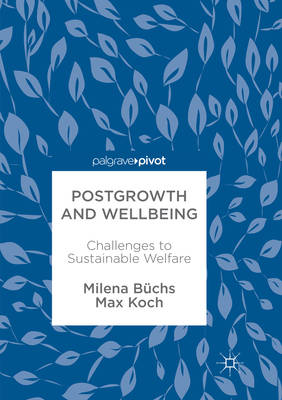
- Afhalen na 1 uur in een winkel met voorraad
- Gratis thuislevering in België vanaf € 30
- Ruim aanbod met 7 miljoen producten
- Afhalen na 1 uur in een winkel met voorraad
- Gratis thuislevering in België vanaf € 30
- Ruim aanbod met 7 miljoen producten
Zoeken
Postgrowth and Wellbeing
Challenges to Sustainable Welfare
Milena Büchs, Max Koch
Paperback | Engels
€ 68,95
+ 137 punten
Uitvoering
Omschrijving
This book presents a detailed and critical discussion about how human wellbeing can be maintained and improved in a postgrowth era. It highlights the close links between economic growth, market capitalism, and the welfare state demonstrating that, in many ways, wellbeing outcomes currently depend on the growth paradigm. Here the authors argue that notions of basic human needs deserve greater emphasis in debates on postgrowth because they are more compatible with limits to growth. Drawing on theories of social practices, the book explores structural barriers to transitions to a postgrowth society, and ends with suggestions for policies and institutions that could support wellbeing in the context of postgrowth. This thought-provoking work makes a valuable contribution to debates surrounding climate change, sustainability, welfare states and inequality and will appeal to students and scholars of social policy, sociology, political science, economics, political ecology and humangeography.
Specificaties
Betrokkenen
- Auteur(s):
- Uitgeverij:
Inhoud
- Aantal bladzijden:
- 144
- Taal:
- Engels
Eigenschappen
- Productcode (EAN):
- 9783319867304
- Verschijningsdatum:
- 4/08/2018
- Uitvoering:
- Paperback
- Formaat:
- Trade paperback (VS)
- Afmetingen:
- 148 mm x 210 mm
- Gewicht:
- 453 g

Alleen bij Standaard Boekhandel
+ 137 punten op je klantenkaart van Standaard Boekhandel
Beoordelingen
We publiceren alleen reviews die voldoen aan de voorwaarden voor reviews. Bekijk onze voorwaarden voor reviews.











